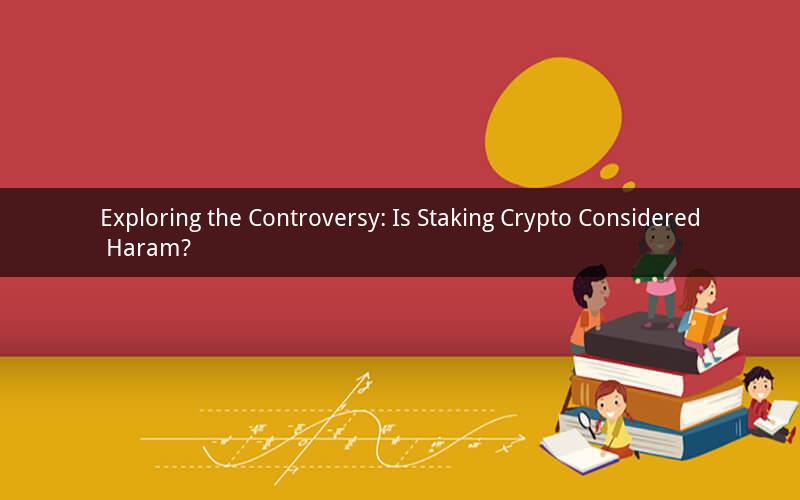
In recent years, the rise of cryptocurrencies has sparked a heated debate among Muslims regarding their religious legitimacy. One of the most contentious issues is the practice of staking cryptocurrencies. This article delves into the Islamic perspective on staking crypto, examining whether it is considered haram (forbidden) or halal (permitted) in Islam.
1. What is Staking Crypto?
Staking is a process where cryptocurrency holders lock up their coins in a wallet or a staking pool to support the network and earn rewards in return. By staking, users help validate transactions and secure the blockchain, thereby contributing to the network's decentralization and stability. The rewards earned from staking vary depending on the cryptocurrency and the amount of coins staked.
2. Islamic Perspective on Staking Crypto
The Islamic perspective on staking crypto is multifaceted, with some scholars considering it permissible while others argue it is haram. Here are the key arguments from both sides:
a. Permissible Argument
Some Islamic scholars argue that staking crypto is halal because it involves a form of investment. They believe that as long as the staking process does not involve interest (riba) and is conducted in a transparent manner, it can be considered permissible. Additionally, they argue that the rewards earned from staking are a form of return on investment, which is permissible in Islam.
b. Haram Argument
On the other hand, some scholars argue that staking crypto is haram due to several reasons:
i. Interest (Riba): One of the primary reasons why some scholars consider staking haram is the potential involvement of interest. While staking does not involve direct lending or borrowing, the rewards earned from staking can be seen as a form of interest, which is strictly forbidden in Islam.
ii. Uncertainty of Returns: Another concern is the uncertainty of returns from staking. Since the rewards depend on various factors, including the cryptocurrency's market value and network performance, some scholars argue that this uncertainty makes staking akin to gambling, which is haram.
iii. Lack of Transparency: Some staking platforms may not be fully transparent, making it difficult for Muslims to ensure that their investments are compliant with Islamic principles. This lack of transparency can lead to potential ethical issues, such as involvement in illegal activities or supporting companies that engage in haram practices.
3. The Role of Islamic Financial Institutions
Islamic financial institutions play a crucial role in providing guidance and solutions for Muslims regarding staking crypto. Some institutions have developed Sharia-compliant staking platforms that adhere to Islamic principles, while others advise against staking altogether.
4. Staking Crypto in Practice
Despite the ongoing debate, many Muslims are participating in staking crypto, seeking to maximize their returns while adhering to Islamic principles. Here are some tips for Muslims considering staking crypto:
a. Conduct thorough research: Before engaging in staking, it is essential to research the cryptocurrency and the staking platform to ensure they are Sharia-compliant.
b. Choose a reputable platform: Opt for a staking platform that is transparent and has a strong track record of adhering to Islamic principles.
c. Stay informed: Keep up with the latest developments in the cryptocurrency market and Islamic finance to make informed decisions.
5. Conclusion
The debate over whether staking crypto is haram or halal in Islam continues to evolve. While some scholars argue that staking is permissible as a form of investment, others believe it is haram due to potential involvement of interest and uncertainty of returns. Muslims considering staking crypto should conduct thorough research, choose reputable platforms, and stay informed about the latest developments in Islamic finance.
Questions and Answers:
1. Q: Is staking crypto considered haram in Islam?
A: The Islamic perspective on staking crypto is divided, with some scholars considering it halal and others haram.
2. Q: Can staking crypto be considered a form of investment?
A: Yes, some scholars argue that staking crypto can be considered a form of investment as it involves locking up coins to earn rewards.
3. Q: Are there any Sharia-compliant staking platforms available?
A: Yes, some Islamic financial institutions have developed Sharia-compliant staking platforms that adhere to Islamic principles.
4. Q: How can Muslims ensure that their staking activities are Sharia-compliant?
A: Muslims can ensure their staking activities are Sharia-compliant by conducting thorough research, choosing reputable platforms, and staying informed about the latest developments in Islamic finance.
5. Q: What are the potential risks associated with staking crypto?
A: The potential risks include involvement of interest, uncertainty of returns, and lack of transparency in some staking platforms.